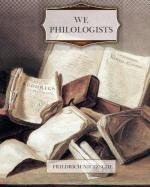Goethe as a German poet-philologist; Wagner as a still higher stage: his clear glance for the only worthy position of art. No ancient work has ever had so powerful an effect as the “Orestes” had on Wagner. The objective, emasculated philologist, who is but a philistine of culture and a worker in “pure science,” is, however, a sad spectacle.
173
Between our highest art and philosophy and that which is recognised to be truly the oldest antiquity, there is no contradiction: they support and harmonise with one another. It is in this that I place my hopes.
174
The main standpoints from which to consider the importance of antiquity:
1. There is nothing about it for young people, for it exhibits man with an entire freedom from shame.
2. It is not for direct imitation, but it teaches by which means art has hitherto been perfected in the highest degree.
3. It is accessible only to a few, and there should be a police des moeurs, in charge of it—as there should be also in charge of bad pianists who play Beethoven.
4. These few apply this antiquity to the judgment of our own time, as critics of it; and they judge antiquity by their own ideals and are thus critics of antiquity.
5. The contract between the Hellenic and the Roman should be studied, and also the contrast between the early Hellenic and the late Hellenic.—Explanation of the different types of culture.
175
The advancement of science at the expense of man is one of the most pernicious things in the world. The stunted man is a retrogression in the human race: he throws a shadow over all succeeding generations The tendencies and natural purpose of the individual science become degenerate, and science itself is finally shipwrecked: it has made progress, but has either no effect at all on life or else an immoral one.
176
Men not to be used like things!
From the former very incomplete philology and knowledge of antiquity there flowed out a stream of freedom, while our own highly developed knowledge produces slaves and serves the idol of the State.
177
There will perhaps come a time when scientific work will be carried on by women, while the men will have to create, using the word in a spiritual sense: states, laws, works of art, &c.
People should study typical antiquity just as they do typical men: i.e., imitating what they understand of it, and, when the pattern seems to lie far in the distance, considering ways and means and preliminary preparations, and devising stepping-stones.
178
The whole feature of study lies in this: that we should study only what we feel we should like to imitate; what we gladly take up and have the desire to multiply. What is really wanted is a progressive canon of the ideal model, suited to boys, youths, and men.




